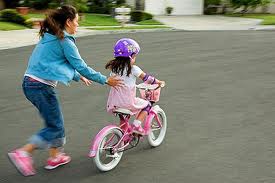Recently I wrote a post on the experience of teaching my daughter to ride her two-wheel bike for the first time. From my experience of being a road cyclist and watching her gain skills for balance on the bike, I noticed the parallels of cycling and recovery.  In this post I want to look at the perspective of the person running behind the bike. The experience of being a parent and running behind the bike supporting my daughter with the need to let go, I am reminded of the spouse’s process necessary in the recovery process of sex addiction. Have you experienced the feeling of running behind a child, supporting the child on the bike, yet, knowing you need to let go? Do you remember the feeling the panic of the moment you knew you needed to let them go so they will find their own skill, power, and strength to continue? How can a parent let go running behind the bike knowing full well there might be hurt involved? How can a spouse stop being vigilant knowing there might be more unconscionable collateral damage? Often, the spouse has been broadsided with the discovery of the addiction and it would seem counter-intuitive to let go of vigilance now!
In this post I want to look at the perspective of the person running behind the bike. The experience of being a parent and running behind the bike supporting my daughter with the need to let go, I am reminded of the spouse’s process necessary in the recovery process of sex addiction. Have you experienced the feeling of running behind a child, supporting the child on the bike, yet, knowing you need to let go? Do you remember the feeling the panic of the moment you knew you needed to let them go so they will find their own skill, power, and strength to continue? How can a parent let go running behind the bike knowing full well there might be hurt involved? How can a spouse stop being vigilant knowing there might be more unconscionable collateral damage? Often, the spouse has been broadsided with the discovery of the addiction and it would seem counter-intuitive to let go of vigilance now!
As a parent teaching skills, or as a spouse in the relationship affected by sex addiction, we know we NEED to let go. Working through the fear of letting go and actually letting go are quite another story. Any parent who has taught their child to ride a bike knows the difficulty in letting go and similarly, any partner who has felt the absolute power of betrayal from sex addiction knows the fear of letting go. Once it is time to transition to two-wheel riding, it is a time for the parent to prepare to let go and allow the child to gain necessary skills of safety. Once the sex addiction is surfaced, often previously hidden in secret, the spouse must learn to let go. Addict and spouse alike need new skills to master safety in life and in the relationship. This is quite a paradox to let go and trust in the face of fear.

I mentioned Soren Kierkegaard’s writings on the “leap of faith” in my previous post. Addicts need to make a leap of faith to trust the recovery process. In my mind there is no greater leap to make than the spouse who has felt the betrayal of sex addiction in their relationship. As the parent who runs behind the bike, if they don’t let go once the child is gaining the skills to begin, they can undermine the child’s ability to learn from natural consequences. A spouse who stays vigilant over their spouses recovery runs risk of not only enabling or undermining their spouses recovery, but their own growth process by learning the ability to self-soothe and gain new skills for healthy safe relationships. Easier said than done and one of the paradoxes of recovery.
Soren Kierkegaard’s leap of faith is the concept of independence is gained in interdependence. The mother who believes her child can take those first steps or pedals and actually cheers them on creates a better environment of skill building and the child’s belief in self-mastery than the parent who might knowingly, or unknowingly, tell or imply to their child they can’t. Often I hear partners of sex addicts say: “My partner was the one acting out and has the problem! Why do I have to work on things?” In addiction there is an interplay of dynamics in the family and /or couple’s relationship system. The parent running behind the bike doesn’t have to master the same exact skills as the person on the bike, but both have to learn skills to make growth a successful endeavor. So it is in the repair process of the couple. There is an interplay of a dynamic relationship and equally the need for new skills for all involved in the addictive process.